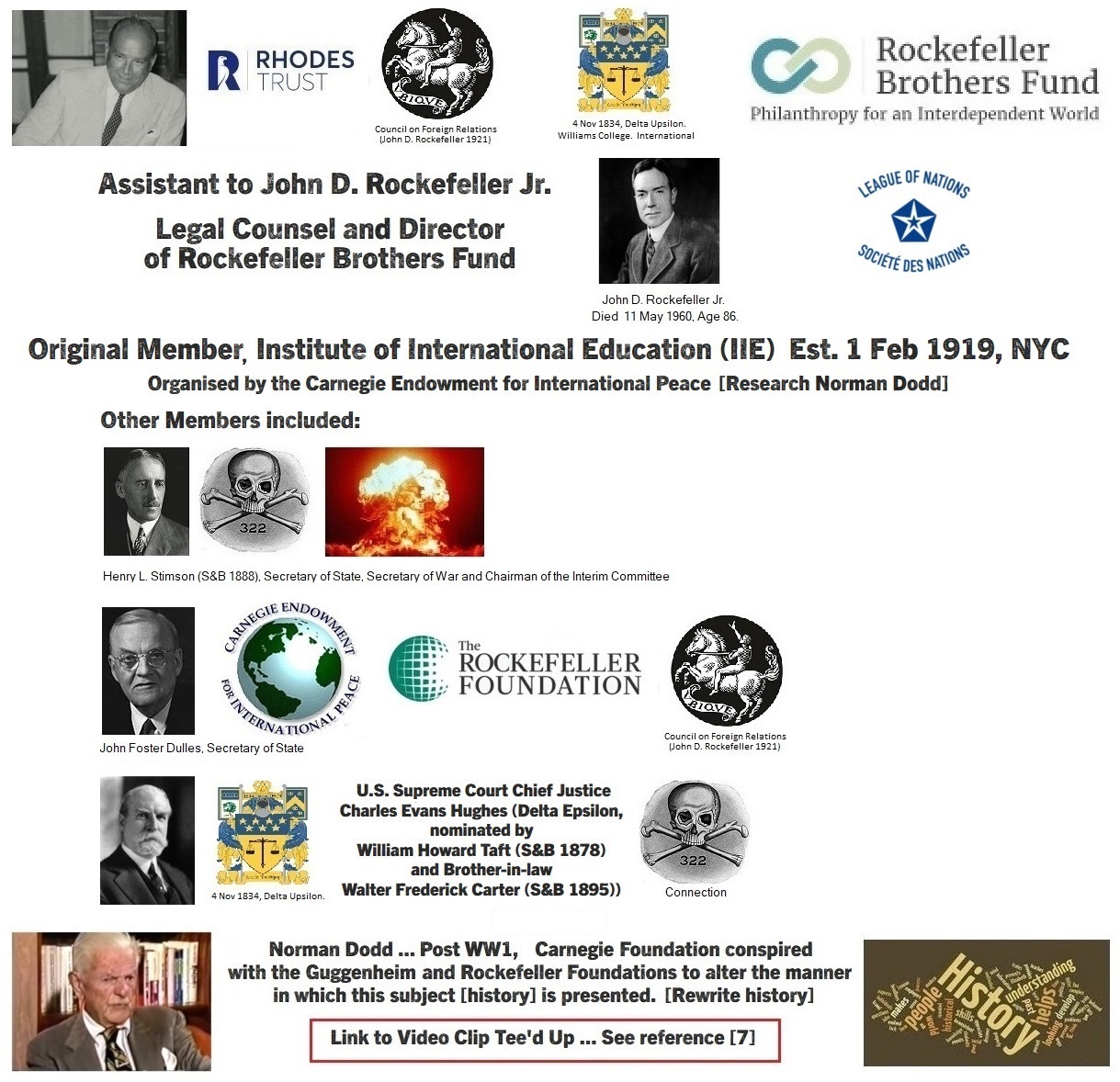
Arthur Worthington Packard (Rhodes 1925)
Brown University. Sphinx Club. President of Delta Upsilon. Phi Beta Kappa. Rhodes Scholar, University of Oxford. Council on Foreign Relations.
Walter S. Lemmon (1896-1971), a radio engineer who worked for IBM. Lemmon had become aware of radio broadcasting’s educational potential when, as a member of Woodrow Wilson’sentourage to Paris in 1919 on the George Washington, he was responsible for the radio-telephone service that was used. Initially, the progress of the peace conference was broadcast from the ship. Later on, Lemmon convinced PresidentWilson to make further broadcasts to the United States on the return voyage. During the following decade, Lemmon became increasingly involved in the development of radio technology. He invented and patented the Single Dial Tuning Control (now standard for radio receivers), which made him independently wealthy through his large annual royalties from RCA. Drawing upon these funds, he founded W1XAL, an experimental short-wave radio station dedicated to educational broadcasting. Lemmon was able to procure two licenses for the station in 1929, and began broadcasting in 1931. In 1935 he approached theRockefeller Foundation(RF) for support, and was invited to submit a proposal by John Marshall, assistant director of the Humanities Division (HD). The application was successful, and a grant-in-aid of $25,000 was awarded for 1935 (grants-in-aid of $40,000 beginning in1936 and of $100,000 beginning in 1938 would subsequently follow). However, in order to receive funding, Lemmon was obliged to form the World Wide Broadcasting Foundation (WWBF) that would administer the grants-in-aid and oversee the broadcasting activities of W1XAL. The RF officers were of the view that the WWBF could serve as a prototype for educational broadcasting. In particular, it was hoped that the station (given its private, yet non-profit status and commitment to serve the public) would play a mediating role in the bitter aftermath of the divisive Communication Act of 1934, and would help improve relations between the government, educational broadcasters, the private sector, and the universities. Viewed as a “vest-pocket version of the BBC,” ….. The slow decline and ultimate demise of Lemmon’s educational-radio venture can be attributed –at least in part -to the increasing rationalization of the “citizen-giving” of Rockefeller family members, as embodied in the Rockefeller Brothers Fund under the watchful eye of Arthur W. Packard (Rhodes 1925).[5]
Assistant to John D. Rockefeller Jr.[4]
Legal Counsel[5], Director of Rockefeller Brothers Fund. Duties consisted of considering and making recommendations concerning various appeals directed to Mr. Rockefeller for philanthropic assistance.[3]
Above all, with the formation of the Rockefeller Brothers Funding 1940, Arthur W. Packard’s (Rhodes 1925) influence on how family members made their donations became even more pronounced. As manager of the new Fund, Packard was charged with consolidating the brothers’ donor activities in the interests of efficiency.[5]
Married Louisa Donald (Granddaughter of Late Evangelist and educator, Dwight L. Moody).[2]
1927 - Attended the League of Nations with Raymond T. Rich, General Secretary of the World Peace Foundation. He will shortly assume the position of Field Secretary of that Foundation, of which President W. H. P Faunce of Brown University is 9th President (pastor Fifth Ave Baptist) and of which A. Lawrence Lowell, President of Harvard University, is a member of the Board of Trustees.[2]
From 1925 to ? - Rhodes Scholar, Merton College, University of Oxford.[1]
1925 - Graduated Brown University.[2] President of Delta Upsilon.
1 Feb 1919 - Original Member, Institute of International Education (IIE).
Presenting Professor Steven Duggan idea that a student exhange of education and ideas would serve to remedy the risk of miss-understanding that result in WW1 [Research S&B and Rhodes players]. Murray Bulter, President of Columbia University and trustee of the newly founded Carnegie Endowment for International Peace [Planning WW1! - Research Norman Dodd], agreedm adding that even intelligent and educated Americans knew little about international relations. They concluded tha the only hope of avoiding future wars [Research S&B and Rhodes players] was to become internationnally minded. A kind of clearinghouse was needed, that could stimulate interest in the study of international realtions, and student exchange.[6]… The central goal of the new organization was to promote a two-way exchange of students and scholars between the United States and all other areas of the world, in every field of study … Scholarships were setup to help support those who had insufficient funds for educational pursuits. Not intending to take on its exchange goals alone, the IIE served primarly as a mediating agency, and in that capacity could establish and manage scholarships, exchange professorships, and take on a wide variety of student programs. Stephen Duggan was appointed IIE’s first director, a post he would hold for 28 years…[6]
1918 - Graduated Dorchester High School.[2]
[2] - NY Times 1 Sep 1928. Marries.
[3] - 23 Dec 1959 - Packard v. United States - references connections to the John D. Rockefeller.
[4] - Letters sent by Arthur W. Packard on behalf of John D. Rockefeller.



Comments